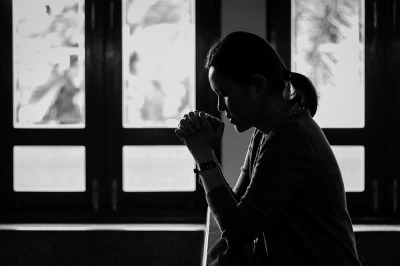An unprecedented social experiment: We were created for community

Jacquie Benetua-Rolens is communications and engagement coordinator at Santa Cruz Community Health Centers. Her two-year-old son has become a fixture in her daily Zoom meetings with colleagues, waving at them in his pajamas.
Before the pandemic, she worked in a small cubicle back at the office. Now that she’s working from home, she told the New York Times, “There is this softened, unfiltered, more honest version of ourselves that I’m enjoying getting to know. There is room to be forgiving and understanding with each other and ourselves. And it’s because we’ve all had to juggle.”
She’s one of millions of Americans taking part in an unprecedented social experiment. A Gallup poll found that a majority of those now working from home would prefer to continue doing so “as much as possible” after the pandemic.
It’s easy to see why. They are spending less time on the road. (The Times article cites a report that the average American who drives to work spends fifty-four hours a year stuck in traffic.) A 2014 study found that those who work from home are more productive. They run less risk of being infected by colleagues. They have more time for fitness during the day.
And a 2005 study found that job satisfaction increased with each additional hour spent working remotely (though it stopped increasing after fifteen hours working remotely).
The relevance of location to happiness
Telecommuting is obviously difficult for those in manufacturing or service jobs. The healthcare heroes saving lives in this pandemic cannot work from home. Nor can the frontline workers delivering food to stores and homes. Or the police officers risking their lives to keep us safe.
The Times article also notes that problem-solving and creativity can suffer when workers are isolated from each other. Such isolation can also lead to loneliness and boredom. And as we noted in yesterday’s Daily Article, homeschooling while working can be very challenging.
My guess is that if the pandemic makes millions of Americans work from home for months or years instead of weeks, we’ll find that our location is less relevant to our happiness than we thought. Introverts will be happier alone, but extroverts will miss interactions with colleagues.
And our work will still be work. If we found meaning in what we did before the pandemic, we will find meaning in it after the pandemic. If we did not, we will not.
“The palace is forsaken, the populous city deserted”
This image in Isaiah 32 seems especially relevant today: “The palace is forsaken, the populous city deserted” (v. 14). Here is what the people need to move into a better future: “Until the Spirit is poured upon us from on high, and the wilderness becomes a fruitful field, and the fruitful field is deemed a forest” (v. 15).
With this result: “Then justice will dwell in the wilderness, and righteousness abide in the fruitful field. And the effect of righteousness will be peace, and the result of righteousness, quietness and trust forever” (vv. 16–17).
Work was never intended by God as an end in itself. Even work that obviously has intrinsic merit, such as saving lives in hospitals or delivering food to the hungry, is a means to the end of helping people.
Healthcare heroes don’t treat COVID-19—they treat patients. Farmers don’t grow crops for the sake of wheat and corn but for those who will eat what they produce.
According to Jesus, the highest priorities of life are loving our Lord and our neighbor (Matthew 22:37–39). All that we do is to be a means to this end.
We fulfill this purpose best when “the Spirit is poured upon us from on high” (cf. Ephesians 5:18; Galatians 5:22–23). Only then will the wilderness become a fruitful field and the fruitful field become a forest.
“As waters cover the sea”
C. S. Lewis observed, “Self-sufficiency, living on one’s own resources, is a thing impossible in [nature]. Everything is indebted to everything else, sacrificed to everything else, dependent on everything else.”
Like the natural world, you and I were created for community. In a website article yesterday, I noted our Creator’s observation, “It is not good that the man should be alone” (Genesis 2:18). One of the most powerful ways we can experience unity in community is to join in united prayer.
This fact motivates today’s National Day of Prayer (NDP). This year’s theme comes from Habakkuk 2:14, “The earth will be filled with the knowledge of the glory of the Lord as the waters cover the sea.” We are called to advance this day through united intercession for our nation.
When I was a pastor in the pre-pandemic days, we gathered outside our worship center every year on the first Thursday in May to pray as a church and community. In these days of social distancing, we can still join the body of Christ in circling the throne of grace together.
The path to peace, security, and rest
Please take time today to join millions of other Christians in praying for America. I will be following the NDP’s suggested guidelines for “praying into seven centers of influence in our nation” and hope you will join me.
We explored Isaiah 32:14–17 today. Let’s close with verse 18: “My people will abide in a peaceful habitation, in secure dwellings, and in quiet resting places.”
In these days of crisis, will you pray today and every day for all Americans to experience the peace, security, and rest found in Christ alone?
Originally posted at denisonforum.org





















